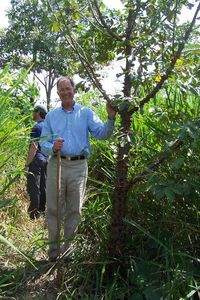Four recommendations for social businesses and nonprofits
/
Photo: Advisory Board member Ned Symes stands with a spiny cedar tree in Panama
Advisory Board member Ned Symes stands with a spiny cedar tree in PanamaLast Wednesday I had the opportunity to sit down with some grad students at American University's International Training and Education Program (ITEP) to discuss social enterprise.
The goal of the discussion was to give up-and-coming entrepreneurs a sense of the challenges behind starting and managing a nonprofit or mission-focused business. Three former ITEP students who have gone on to start their own enterprises also helped lead the discussion.
The two nonprofits represented, Access to Success and Simply Equal Education, are both young and obviously passionate about their work. As they described the challenges they were facing, I thought back on our own version of those same challenges. That's not to say that we're not still dealing with some of them—maintaining a flow of operating capital, managing our operations efficiently, and mission creep to name a few—but now we have the benefit of viewing our early mistakes in hindsight.
Some of the recommendations that came out of our discussion include:
Find the right mix of people
This is one of the most important, in my opinion. For those of us without finance backgrounds for example, it can be daunting to teach yourself bookkeeping or put together a yearly financial report. The finance guys, on the other hand, might not have the tools to put together a marketing plan or website. I'm a firm believer in cross-training your small business muscles, but knowing that someone else does his job well allows you to focus on maximizing your own contribution.
Staff your operations at the local level
While Access to Success, Simply Equal Education and Planting Empowerment all work in foreign countries, our management teams live and work stateside. As Planting Empowerment learned early on, this can easily lead to miscommunication and operational setbacks. It's essential to have local staff in country that you can rely on. In our case, beyond simply ensuring the smooth execution of day-to-day operations, our foreman Liriano Opua represents us in our partner community of Arimae. He understands the needs of the community, their local governance, and all the political machinations that affect our business.
Be patient
The Access to Success presenter described how, during a field visit to Nigeria, she and her Nigerian co-founder traveled to his uncle's place of work to make what she perceived as a simple request. Because of the level of formality in Nigerian family culture, the request took much longer than anticipated due to traditional procedures, but resulted in positive outcomes that helped the organization succeed for the rest of their field visit. This example demonstrates how our first-world sense of timing and process is often different from our targeted beneficiaries. Sometimes, what we see as inefficiency might be simply be a cultural bias towards doing things a certain way. The balance is in preserving the traditional frameworks of your targeted beneficiaries while running an efficient operation.
Maintain passion for the work
OK, this one isn't a recommendation per se, but it does deserve some lines. I'd guess that for most social entrepreneurs or nonprofit founders, passion is one of the main reasons we got into business in the first place (hint: it's not for the money). Usually there is some moment or experience that sparks an idea and sets the entrepreneur in motion. In the beginning it's easy to feed off of your emotions because the experience is so fresh. The challenge is preserving that fire when you start wading into the details of running an operation. And this is where others' recommendations can only take you so far and you'll develop pick-me-ups out of your work. For example, the founders of Simply Equal Education pull out photos of the Equatoguinean schoolchildren who receive their donations of school supplies. For us, it's making the trip to Panama 1-2 times per year to show our stakeholders the firsthand benefit their investments are creating.
These recommendations are, of course, relevant to our enterprises. While we can’t capture all of the possible challenges and recommendations in starting a social enterprise, we hope this is a good start. Feel free to comment with any specific questions.


